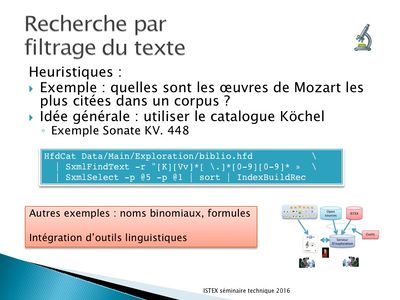Sonate pour deux pianos (Mozart)
De Wicri Musique
La Sonate pour deux pianos en ré majeur, KV 448, est une œuvre de Mozart composée en novembre 1781 à Vienne quand il avait 25 ans.
La sonate a été écrite pour un concert que Mozart donnait avec la pianiste Joséphine von Aurnhammer. La sonate est une des seules œuvres de Mozart écrites pour deux pianos.
Cette œuvre semble avoir des actions thérapeutiques intéressantes dans des situations telles que l'épilepsie ou la maladie d’Alzheimer. On parle même d'« effet Mozart ».
Listes de documents citant cette sonate
- Music exposure improves spatial cognition by enhancing the BDNF level of dorsal hippocampal subregions in the developing rats. Yingshou Xing (République populaire de Chine - 2016)
- Mozart, Mozart Rhythm and Retrograde Mozart Effects: Evidences from Behaviours and Neurobiology Bases Yingshou Xing (République populaire de Chine - 2016)
- The Mozart Effect: A quantitative EEG study. Walter Verrusio (Italie - 2015)
- Mozart's music in children with drug-refractory epileptic encephalopathies. Giangennaro Coppola (Italie - 2015)
- Adjunct effect of music therapy on cognition in Alzheimer’s disease in Taiwan: a pilot study Chien-Hsun Li (Taïwan - 2015)
- Nonpharmacological techniques to reduce pain in preterm infants who receive heel-lance procedure: a randomized controlled trial. Piera Bergomi (Italie - 2014)
- Mozart, music and medicine. Ernest K J. Pauwels (Pays-Bas - 2014)
- Mozart K.448 listening decreased seizure recurrence and epileptiform discharges in children with first unprovoked seizures: a randomized controlled study Lung-Chang Lin (Taïwan - 2014)
- Listening to Mozart K.448 decreases electroencephalography oscillatory power associated with an increase in sympathetic tone in adults: a post-intervention study Lung-Chang Lin (Taïwan - 2014)
- Early evaluation of the therapeutic effectiveness in children with epilepsy by quantitative EEG: a model of Mozart K.448 listening--a preliminary study. Lung-Chang Lin (Taïwan - 2014)
- Early evaluation of the therapeutic effectiveness in children with epilepsy by quantitative EEG: A model of Mozart K.448 listening-a preliminary study Lung-Chang Lin (Taïwan - 2014)
- Parasympathetic activation is involved in reducing epileptiform discharges when listening to Mozart music. Lung-Chang Lin (Taïwan - 2013)
- Mozart K.448 attenuates spontaneous absence seizure and related high-voltage rhythmic spike discharges in Long Evans rats. Lung-Chang Lin (Taïwan - 2013)
- Is silence golden? Effects of auditory stimuli and their absence on adult hippocampal neurogenesis Imke Kirste (Allemagne - 2013)
- Continuous Theta Burst Stimulation (cTBS) on Left Cerebellar Hemisphere Affects Mental Rotation Tasks during Music Listening Silvia Picazio (Italie - 2013)
- G191 THE MOZART EFFECT IN CHILDREN WITH EPILEPTIC EEGS Ek Grylls (Royaume-Uni - 2013)
- Mozart K.448 attenuates spontaneous absence seizure and related high-voltage rhythmic spike discharges in Long Evans rats Lung-Chang Lin (Taïwan - 2013)
- Mozart K.545 Mimics Mozart K.448 in Reducing Epileptiform Discharges in Epileptic Children Lung-Chang Lin (Taïwan - 2012)
- The long-term effect of listening to Mozart K.448 decreases epileptiform discharges in children with epilepsy. Lung-Chang Lin (Taïwan - 2011)
- Mozart K.448 acts as a potential add-on therapy in children with refractory epilepsy. Lung-Chang Lin (Taïwan - 2011)
- Background sound modulates the performance of odor discrimination task Han-Seok Seo (Allemagne - 2011)
- Mozart K.448 and epileptiform discharges: effect of ratio of lower to higher harmonics. Lung-Chang Lin (Taïwan - 2010)
- Mozart effect-Shmozart effect: A meta-analysis Jakob Pietschnig (Autriche - 2010)
- Mozart K.448 and epileptiform discharges: Effect of ratio of lower to higher harmonics Lung-Chang Lin (Taïwan - 2010)
- The influence of Mozart's sonata K.448 on visual attention: an ERPs study. Weina Zhu (République populaire de Chine - 2008)
- The influence of Mozart's sonata K.448 on visual attention : An ERPs study WEINA ZHU (République populaire de Chine - 2008)
- An investigation into the temporal dimension of the Mozart effect : Evidence from the attentional blink task Cristy Ho (Royaume-Uni - 2007)
- The influence of Mozart's music on brain activity in the process of learning Norbert Jausovec (Slovénie - 2006)
- The influence of auditory background stimulation (Mozart's sonata K. 448) on visual brain activity Norbert Jausovec (Slovénie - 2004)
- The "Mozart effect": an electroencephalographic analysis employing the methods of induced event-related desynchronization/synchronization and event-related coherence. Norbert Jausovec (Slovénie - 2003)
- A Mozart effect for women on a mental rotations task. Karen S. Gilleta (Canada - 2003)
- The Mozart effect may only be demonstrable in nonmusicians. A. Twomey (Royaume-Uni - 2002)
- Listening to Mozart does not improve children's spatial ability: Final curtains for the Mozart effect Pippa Mckelvie (Nouvelle-Zélande - 2002)
- FMRI study relevant to the Mozart effect: brain areas involved in spatial-temporal reasoning. M. Bodner (États-Unis - 2001)
- Music enhances spatial-temporal reasoning: towards a neurophysiological basis using EEG. G L Shaw (États-Unis - 1999)
- reply: Prelude or requiem for the Mozart effect? Frances H. Rauscher (États-Unis - 1999)
- Is there a chronic change of the "Mozart effect" on epileptiform activity? A case study J. R. Hughes (États-Unis - 1999)
- The "Mozart effect" on epileptiform activity. J R Hughes (États-Unis - 1998)
- Key components of the Mozart effect. F H Rauscher (États-Unis - 1998)
- The "Mozart Effect" on epileptiform activity J. R. Hughes (États-Unis - 1998)
Observations
On notera une forte présence qu'auteurs venant de Chine ou de Taïwan.
Compléments
Une recherche sur Internet montre différentes réactions sur l'hypothèse « Effet Mozart » et ses expérimentations.
Voir notamment :
- Sur le site « Médecine des arts » :
- L'effet Mozart à l'épreuve de l'expérience scientifique par le Docteur Arcier, fondateur de Médecine des Arts.


